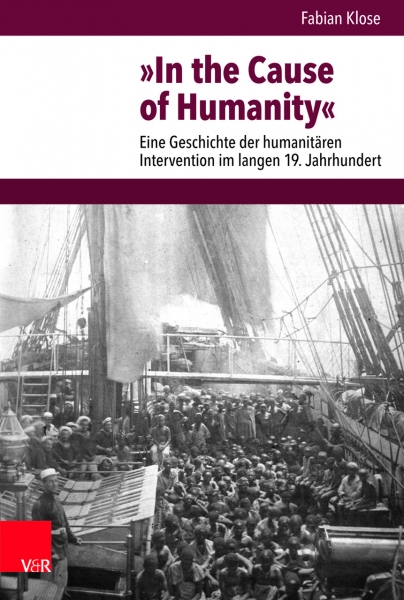Klose, Fabian
Göttingen: Vandenhoeck & Ruprecht, 2019
ISBN: 978-3-525-37084-1
DOI: 10.13109/9783666370847
»In the Cause of Humanity«
Eine Geschichte der humanitären Intervention im langen 19. Jahrhundert
Veröffentlichungen des Instituts für Europäische Geschichte, Mainz, 256: Abt. UniversalgeschichteGöttingen: Vandenhoeck & Ruprecht, 2019
ISBN: 978-3-525-37084-1
DOI: 10.13109/9783666370847

Anhand ausgewählter Fallbeispiele wie dem Kampf gegen den Sklavenhandel (1807–1890), den Militärinterventionen der europäischen Großmächte zur humanitären Nothilfe für christliche Minderheiten im Osmanischen Reich (1827–1878) oder dem Eingreifen der Vereinigten Staaten in den kubanischen Unabhängigkeitskrieg (1898) untersucht Fabian Klose die militärische Praktik und die völkerrechtlichen Debatten zum Schutz humanitärer Normen gewaltsam einzugreifen. Insgesamt etablierte sich in dieser Epoche die Idee der humanitären Intervention als ein anerkanntes Instrumentarium in der internationalen Politik. Eine zentrale Schlüsselrolle bei der Entstehung eines neuen humanitären Interventionsverständnisses übernahm der bewaffnete internationale Kampf gegen den Sklavenhandel als Urtyp der humanitären Intervention. Als Folge kam es zur Ausbildung völkerrechtlicher Leitlinien, die als Begründung für das militärische Eingreifen in verschiedenen Krisenregionen dieser Welt dienten. Das »lange 19. Jahrhundert« kann demnach als das genuine »Jahrhundert der humanitären Intervention« charakterisiert werden, in dem es zu einer signifikanten Verzahnung von militärischem Interventionismus unter dem Banner der Humanität mit kolonialen und imperialen Projekten kam.
Ausgezeichnet mit dem Carl-Erdmann-Preis 2018 des Verbands der Historiker und Historikerinnen (VDH) Deutschlands.
The question of whether, when and how the international community should react to violations of humanitarian norms and related humanitarian crises is undoubtedly one of the most controversially debated issues on the agenda of today's international politics. However, the problem did not suddenly emerge at the end of the 20th and beginning of the 21st century, but was already the subject of controversy during the course of the "long 19th century".
Focusing on selected case studies such as the international fight against the slave trade (1807–1890), the military interventions of the major European powers on humanitarian emergency aid for Christian minorities in the Ottoman Empire (1827–1878) and the intervention of the United States in the Cuban War of Independence (1898), Fabian Klose investigates the emergence of the military practice and related legal debates on the protection of humanitarian norms by violent means. The idea of humanitarian intervention established itself as a recognized instrument in international politics during this period. In this respect, the international fight against the slave trade became the primal type of this new practice and played a key role in the emergence of a new understanding of humanitarian interventionism. As a result, guidelines under international law were developed, that served as justification for military intervention in various crisis regions of the world. Thus, the "long 19th century" can be indeed described as the genuine "century of humanitarian intervention", in which military interventionism under the banner of humanity was significantly intertwined with colonial and imperial projects.


